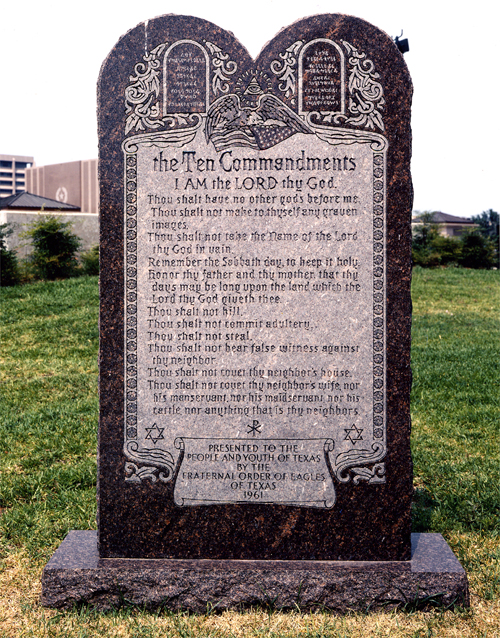Decalogue
 |
Decalogue |
Comments about the Decalogue Ten Commandments from the Westminster Confession of Faith (WCF)
We should notice, as well, that there is remarkable difference in the treatment of the "ceremonial law" and the "judicial law" in the Confession.
(1) Without equivocation the ceremonial law is declared "abrogated" (19:3). But the judicial law is said to have "expired," except for the "general equity." Why was it not declared "abrogated" and reference made to the New Testament for judicial principles? Or to pre-Mosaic directives, such as the Noahic Covenant? And why do the judicial laws appear in the proof-texts for the Larger Catechism exposition of the Ten Commandments? Samuel Willard (1640-1707), pastor at Boston's Old South Church, in his Compleat Body of Divinity (posthumous, 1726): "With respect to the Judicial Laws, we must observe, that these were Appendices, partly of the Moral, partly of the Ceremonial Law: Now such as, or so far as they are related to the Ceremonial, they are doubtless Abolished with it. As, and as far as they bear respect to the Moral Law, they do, eo Nomine, require Obedience perpetual, and are therefore reducible to Moral Precepts."
(2) Throughout the exposition of the Ten Commandments in the Larger Catechism, we find reference to numerous case laws. We must remember that the division of the Law by the Confession is three-fold: Moral (which involves only the 10 commandments), ceremonial (which involve symbolic, redemptive laws), and judicial (which involves all the rest, many of which are cited in the Larger Catechism). Interestingly, even one of the more difficult capital punishment laws (Deut. 13) appears several times in proof-texting the second commandment.
(3) At WCF 20:1 we read: "But, under the new testament, the liberty of Christians is further enlarged, in their freedom from the yoke of the ceremonial law, to which the Jewish Church was subjected...." No mention of the moral or judicial divisions of the law are noted here.
R. L. Dabney, Lectures in Systematic Theology, p. 412, re: Lev. 18 law against incest:
We hold that this law, although found int he Hebrew code, has not passed away; because neither ceremonial nor typical.... We argue also, presumptively, that if this law is a dead one, then the Scriptures contain nowhere a distinct legislation against this great crime of incest." The same would be true of bestiality and other crimes. On page 402 he states: "The laws of Moses, therefore, very properly made adultery a capital crime....
On page 403 Dabney lists capital punishment laws for murder, striking a parent, adultery, etc., without any disapprobation.
Exodus 20:1-17
1 And God spake all these words, saying,
2 I am the LORD thy God, which have brought thee out of the land of Egypt, out of the house of bondage.
3 Thou shalt have no other gods before me.
4 Thou shalt not make unto thee any graven image, or any likeness of any thing that is in heaven above, or that is in the earth beneath, or that is in the water under the earth.
5 Thou shalt not bow down thyself to them, nor serve them: for I the LORD thy God am a jealous God, visiting the iniquity of the fathers upon the children unto the third and fourth generation of them that hate me;
6 And shewing mercy unto thousands of them that love me, and keep my commandments.
7 Thou shalt not take the name of the LORD thy God in vain; for the LORD will not hold him guiltless that taketh his name in vain.
8 Remember the sabbath day, to keep it holy.
9 Six days shalt thou labour, and do all thy work:
10 But the seventh day is the sabbath of the LORD thy God: in it thou shalt not do any work, thou, nor thy son, nor thy daughter, thy manservant, nor thy maidservant, nor thy cattle, nor thy stranger that is within thy gates:
11 For in six days the LORD made heaven and earth, the sea, and all that in them is, and rested the seventh day: wherefore the LORD blessed the sabbath day, and hallowed it.
12 Honour thy father and thy mother: that thy days may be long upon the land which the LORD thy God giveth thee.
13 Thou shalt not kill.
14 Thou shalt not commit adultery.
15 Thou shalt not steal.
16 Thou shalt not bear false witness against thy neighbour.
17 Thou shalt not covet thy neighbour's house, thou shalt not covet thy neighbour's wife, nor his manservant, nor his maidservant, nor his ox, nor his ass, nor any thing that is thy neighbour's
Ten Commandments Decalogue
The above is commonly known as the Ten Commandments. The Decalogue, meaning 10, is another name for them, and the term is well known in the Christian community.
Decalogue bring you these Bible verses
Proverbs 21:22-2422 A wise man scaleth the city of the mighty, and casteth down the strength of the confidence thereof.
23 Whoso keepeth his mouth and his tongue keepeth his soul from troubles.
24 Proud and haughty scorner is his name, who dealeth in proud wrath.
- Home
The Ten Commandments - First Commandment
- Seventh Commandment
- Ten Commandments Meaning of Law
- Decalogue
- FREE Sunday School Material about
America's Christian Heritage - Ten Commandments Map
- Links
- Spanish 10 Commandments Los Diez Mandamientos En Espanol
Ten Commandments for Children
1. Thou shalt have no other gods before me.2. Thou shalt not make unto thee any graven image.
3. Thou shalt not take the name of the Lord thy God in vain.
4. Remember the sabbath day, to keep it holy.
5. Honour thy father and thy mother.
6. Thou shalt not kill.
7. Thou shalt not commit adultery.
8. Thou shalt not steal.
9. Thou shalt not bear false witness against thy neighbor.
10. Thou shalt not covet.
Found in Deuteronomy 5:6-21 and in Exodus 20:1-17
Ten Commandments for Kids